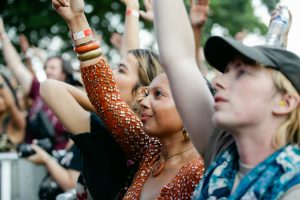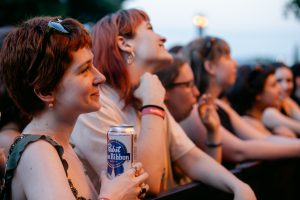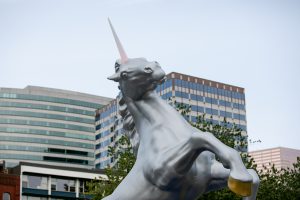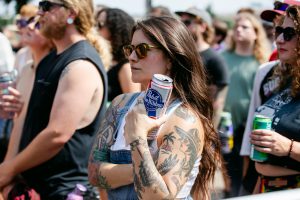Project Pabst: Portland and Pabst Blue Ribbon find their groove
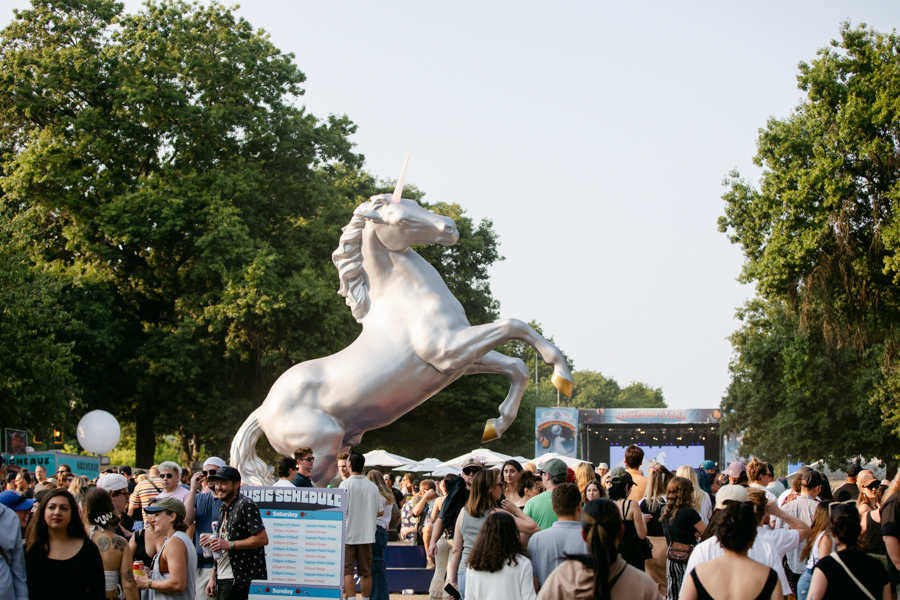
Attendees at Project Pabst at Tom McCall Waterfront Park in Portland, Ore. on July 27, 2024. Photos: Leah Flores.
By Ben Niesen
The Pabst Brewing Company is no stranger to comeback stories and it has long known the feeling of being left out in the rain.
Once the premier brewer in Milwaukee and a competitor to Anheuser-Busch and Miller, the company cratered from over 18 million barrels in sales in 1977 to just under 1 million barrels in 2001. By 1996, the company closed its brewing facilities in Milwaukee and moved to San Antonio. Pabst became a “virtual brewer,” contracting out production of its flagship beer to other breweries.
RELATED STORIES:
• Billy Idol, T-Pain ring in Project Pabst’s return to Portland
• Big Thief, Denzel Curry close down Project Pabst in Portland
In 2002, however, a funny thing happened: sales increased. Across the country, Pabst began to find itself a home among trend-setting neighborhoods of the Mission District in San Francisco or Lower East Side in Manhattan and becoming a standard in the “Hipster’s Handbook.” It also carved out a market share in Portland, Ore., a city known for microbrews and IPAs more than light beer.
“Portland has been our no. 1 market since the resurgence of the brand,” Pabst Vice President of On-Premise Sales Matt Slessler said in a call the week of Project Pabst, the resurrected music festival in Portland.
Slessler is the quintessential Portlander. An avid music fan, he describes the Violent Femmes’ first album as a “Catcher in the Rye” moment for him as a teen. He talked to us as he drove though his hometown, delivering Project Pabst tickets to local bars.
The music festival first started in Portland in 2014.
Slessler said it was “a thank you to Portland for supporting us from the very beginning,” as well as simple business. Pabst, which also owns the local light beer imprint Rainier, had dramatically shifted its marketing approach. No longer one of the larger conglomerates that could afford to flood televisions with advertising, the company pivoted to underwriting niche events and guerilla marketing.
“We kind of kept looking at that and going, well, why don’t we just throw our own festival,” Slessler saod. “We can charge what we want to charge and we can book the band that we want to book, and we know that we’re going to be able to do it the next year if we want to.”
That first year, 27 artists led by Modest Mouse, Tears for Fears, GZA and the Violent Femmes played over two days in September at Zidell Yards. “Under the Ross Island Bridge,” the show poster specified, next to the city’s South Waterfront neighborhood still under development.
“When we first started this in 2014, let’s face it, Portland was kind of the belle of the ball in the whole country,” Slessler said.
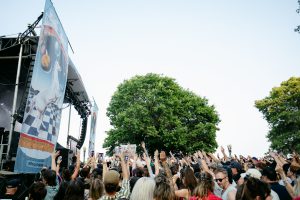
Attendees watch T-Pain perform at Project Pabst at Tom McCall Waterfront Park in Portland, Ore. on July 27, 2024.
The city was regularly ranked as one of the best travel destinations by TripAdvisor; hosted two television series (“Grimm” and the iconic “Portlandia”), and its two sports teams, the Portland Trail Blazers and Timbers, were entering periods of prolonged success. Despite a rising cost of living, Portland was still riding high and welcoming more and more transplants from out of state—all great ingredients for a music festival.
“This market was starved for a larger scale festival, right downtown, two days where you could valet your bike or walk across a bridge and you’re at the festival,” Slessler said.
After two wildly successful editions, the project expanded to one-day, satellite festivals in bigger cities like Denver, Atlanta and Philadelphia. By 2017, the last year of Project Pabst in Portland, the company of 150 employees had hosted over 13 different iterations across four years. The line between beer company and concert promoter began to blur.
“It was taking up a lot of bandwidth,” Slessler said. “We don’t have a lot of people. We had a new regime that came in that was wondering why we were spreading ourselves so thin. And then, when we finished that festival in Portland in 2017, we just really didn’t know if we could top it.”
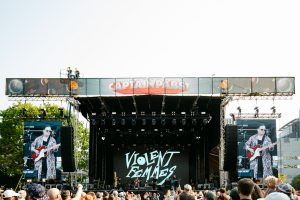
Violent Femmes perform during Project Pabst at Tom McCall Waterfront Park in Portland, Ore. on July 27, 2024.
Pabst declined to continue its showcase in 2018. By this time, “Grimm” had finished its run and IFC was airing the final season of “Portlandia.” The city soldiered on as its national spotlight faded.
A watershed moment came during the summer of 2020, after the pandemic and protests in solidarity with Black Lives Matter robbed downtown of its trademark color and appeal. Then-President Donald Trump ordered the National Guard to keep the peace and tweeted his disapproval of the city. Mayor Ted Wheeler rebuked Trump’s claims. Regardless, the damage was done and the comments reframed the discussion of Portland from plucky hipster town to a broke-down disaster.
Four years later, the city is beginning to see signs of a recovery. The downtown hums with new energy. The MAX light-rail delivers residents from as far west as Hillsboro and as far east as Gresham to the city center. Pioneer Square, affectionately known as Portland’s living room, hosts concerts every weekend. The sun peeks through the early cloud cover, forecast to shine in the afternoon. The Timbers are deep in the chase for their first playoff berth in almost three years, and the Blazers… Well, these things are a process.
Meanwhile, Project Pabst was back after seven years. This time it was held at Tom McCall Waterfront Park, right downtown. For Slessler, the renewed project was the product of a cycle that started with a host of new hires looking at the old lineup posters and images of a unicorn statue rearing out of the masses.
“Everybody was just kind of like, wait, we used to do this and we stopped, what the hell?” he said.
What cemented the change was a new executive team meeting local wholesalers in the Pacific Northwest. As Slessler described it, the question was simple and the message clear: “When are you guys going to stop messing around and just do Project Pabst again?”
When executives announced to Pabst employees in December that the festival would return, there was a standing ovation, Slessler said. The company worked with local concert promoters True West, while the Pabst team identified artists they wanted to book.
Headlined by Billy Idol, T-Pain, Big Thief and the returning Violent Femmes, Project Pabst also gave plenty of shine to local artists like Gossip, STRFKR and Glitterfox.
For Slessler, the return of Project Pabst was a bet on Portland.
“We wanted to show that we weren’t just going to be here when Portland was great,” he said. “We wanted to be here when people were taking a few shots at Portland and help them get a win.”
Gossip, which first rose to prominence in the independent rock circuit during Portland’s rise to national prominence, now had a chance to reintroduce themselves to the city on Saturday. They did so to raucous applause, propelling the momentum of a great first day.
A common sentiment among attendees was that the festival had added to the city’s growing sense of civic self-rediscovery.
“In the past few years, I’ve never really had a reason to come down here,” festival-goer Joshua said. “We have the [Portland] Blues Festival, but it’s not for everybody. This appeals to a wider variety of people.”
Chloe, a Colorado transplant, said she felt like Project Pabst was bringing people together.
“This is the first festival that I’ve seen in Portland with some of the biggest acts like Big Thief, Soccer Mommy,” said Gabriella De La Cruz, the frontwoman of Portland indie rock act Presidio, who was there to support Sunday openers Glitterfox. Much like Gossip in the mid-aughts, Glitterfox and Presidio reflect the rediscovered confidence of Portland’s music scene.
The city is the titular character in Glitterfox’s current signature song, “Portland,” released on Kill Rock Stars in March of this year. Led by singer Solange Igoa and guitarist Andrea Walker, the band snuggles cozily in the LGBTQ+ country-rock category championed by Orville Peck and Brandi Carlile. The song’s central chorus revels in how the band arrived; “I broke down in every town from here to Portland,” Igoa thunders, then pours, “when I finally made it, the rain came down.”
It’s a sound that sums up Portland as a place; progressive but rootsy, with a chip on its shoulder.
“I think this city is best when it’s got a little bit of an underdog mentality,” Slessler said. “I think this city is best when people are trying to take shots at it. And I think we kind of have a, ‘Come on, fuck with us’ attitude. We’ll show you how great our city is. And I think that’s what we’re having right now.”
Pabst Marketing Director Rachel Keeton said the festival allowed the company’s different teams to pull together, explore the city and Forest Park, and enjoy the music.
“It really feels like the weekend couldn’t have gone better for us,” she said.
For Slessler, grading the success of the weekend was more than about net profit, good weather or any other quantifiable metric. Just hosting the festival again and having people come and go safely was “the win.”

